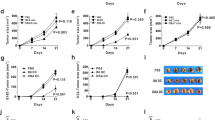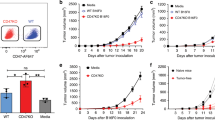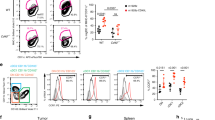Abstract
Tumor antigen gene-modified dendritic cells (DC) generates robust antigen-specific protective antitumor responses. Though the role of CD4 positive and CD8 positive cells in the immunological response to gene-modified DC has been well-characterized, the role of NK cells in this response has been somewhat less clear. Owing to the significant contribution of innate immunity in other model systems, we postulated that NK cells would hold a critical position in the generation of an immune response following immunization with tumor antigen-engineered DC. Immunization with MART-1 melanoma antigen-engineered DC in C57BL/6 mice resulted in the generation of antigen-specific cytotoxic T lymphocytes and in vivo protective responses to the murine B16 melanoma. These responses were dependent on the presence of functional NK cells, although NK cells alone were not sufficient in generating protective responses. Adoptive transfer of NK cells into an NK-deficient but T-cell-competent environment restored the protective response to gene-modified DC immunization. In conclusion, protective immunity after tumor antigen gene-modified DC immunization requires collaboration between CD4+ and CD8+ T cells and NK cells.
This is a preview of subscription content, access via your institution
Access options
Subscribe to this journal
Receive 12 print issues and online access
$259.00 per year
only $21.58 per issue
Buy this article
- Purchase on Springer Link
- Instant access to full article PDF
Prices may be subject to local taxes which are calculated during checkout







Similar content being viewed by others
References
Ribas A, Butterfield LH, Glaspy JA, Economou JS . Cancer immunotherapy using gene-modified dendritic cells. Curr Gene Ther. 2002;2:57–78.
Fernandez NC, Lozier A, Flament C, et al. Dendritic cells directly trigger NK cell functions: cross-talk relevant in innate anti-tumor immune responses in vivo. Nat Med. 1999;5:405–411.
Cayeux S, Richter G, Becker C, Pezzutto A, Dorken B, Blankenstein T . Direct and indirect T cell priming by dendritic cell vaccines. Eur J Immunol. 1999;29:225–234.
Zitvogel L . Dendritic and natural killer cells cooperate in the control/switch of innate immunity. J Exp Med. 2002;195: F9–F14.
Gerosa F, Baldani-Guerra B, Nisii C, Marchesini V, Carra G, Trinchieri G . Reciprocal activating interaction between natural killer cells and dendritic cells. J Exp Med. 2002;195: 327–333.
Piccioli D, Sbrana S, Melandri E, Valiante NM . Contact-dependent stimulation and inhibition of dendritic cells by natural killer cells. J Exp Med. 2002;195:335–341.
Ferlazzo G, Tsang ML, Moretta L, Melioli G, Steinman RM, Munz C . Human dendritic cells activate resting natural killer (NK) cells and are recognized via the NKp30 receptor by activated NK cells. J Exp Med. 2002;195:343–351.
Tanaka F, Hashimoto W, Okamura H, Robbins PD, Lotze MT, Tahara H . Rapid generation of potent and tumor-specific cytotoxic T lymphocytes by interleukin 18 using dendritic cells and natural killer cells. Cancer Res. 2000;60:4838–4844.
Schnurr M, Scholz C, Rothenfusser S, et al. Apoptotic pancreatic tumor cells are superior to cell lysates in promoting cross-priming of cytotoxic T cells and activate NK and gammadelta T cells. Cancer Res. 2002;62:2347–2352.
Brossart P, Goldrath AW, Butz EA, Martin S, Bevan MJ . Virus-mediated delivery of antigenic epitopes into dendritic cells as a means to induce CTL. J Immunol. 1997;158:3270–3276.
Kaplan JM, Yu Q, Piraino ST, et al. Induction of antitumor immunity with dendritic cells transduced with adenovirus vector-encoding endogenous tumor-associated antigens. J Immunol. 1999;163:699–707.
Klein C, Bueler H, Mulligan RC . Comparative analysis of genetically modified dendritic cells and tumor cells as therapeutic cancer vaccines. J Exp Med. 2000;191:1699–1708.
Butterfield LH, Koh A, Meng W, et al. Generation of human T-cell responses to an HLA-A2.1-restricted peptide epitope derived from alpha-fetoprotein. Cancer Res. 1999;59:3134–3142.
Tillman BW, Hayes TL, DeGruijl TD, Douglas JT, Curiel DT . Adenoviral vectors targeted to CD40 enhance the efficacy of dendritic cell-based vaccination against human papillomavirus 16-induced tumor cells in a murine model. Cancer Res. 2000;60:5456–5463.
De Veerman M, Heirman C, Van Meirvenne S, et al. Retrovirally transduced bone marrow-derived dendritic cells require CD4+ T cell help to elicit protective and therapeutic antitumor immunity. J Immunol. 1999;162:144–151.
Schnell S, Young JW, Houghton AN, Sadelain M . Retrovirally transduced mouse dendritic cells require CD4+ T cell help to elicit antitumor immunity: implications for the clinical use of dendritic cells. J Immunol. 2000;164:1243–1250.
Gong J, Chen L, Chen D, et al. Induction of antigen-specific antitumor immunity with adenovirus-transduced dendritic cells. Gene Therapy. 1997;4:1023–1028.
Tuting T, DeLeo AB, Lotze MT, Storkus WJ . Genetically modified bone marrow-derived dendritic cells expressing tumor-associated viral or “self” antigens induce antitumor immunity in vivo. Eur J Immunol. 1997;27:2702–2707.
Tuting T, Steitz J, Bruck J, et al. Dendritic cell-based genetic immunization in mice with a recombinant adenovirus encoding murine TRP2 induces effective anti-melanoma immunity. J Gene Med. 1999;1:400–406.
Melero I, Duarte M, Ruiz J, et al. Intratumoral injection of bone-marrow derived dendritic cells engineered to produce interleukin-12 induces complete regression of established murine transplantable colon adenocarcinomas. Gene Therapy. 1999;6:1779–1784.
Cao X, Zhang W, Wang J, et al. Therapy of established tumour with a hybrid cellular vaccine generated by using granulocyte–macrophage colony-stimulating factor genetically modified dendritic cells. Immunology. 1999;97:616–625.
Cao X, Zhang W, He L, et al. Lymphotactin gene-modified bone marrow dendritic cells act as more potent adjuvants for peptide delivery to induce specific antitumor immunity. J Immunol. 1998;161:6238–6244.
Zhang W, He L, Yuan Z, et al. Enhanced therapeutic efficacy of tumor RNA-pulsed dendritic cells after genetic modification with lymphotactin. Hum Gene Ther. 1999;10: 1151–1161.
Yang S, Vervaert CE, Burch Jr J, Grichnik J, Seigler HF, Darrow TL . Murine dendritic cells transfected with human GP100 elicit both antigen-specific CD8(+) and CD4(+) T-cell responses and are more effective than DNA vaccines at generating anti-tumor immunity. Int J Cancer. 1999;83:532–540.
Ishida T, Chada S, Stipanov M, et al. Dendritic cells transduced with wild-type p53 gene elicit potent anti-tumour immune responses. Clin Exp Immunol. 1999;117:244–251.
Chen Y, Emtage P, Zhu Q, et al. Induction of ErbB-2/neu-specific protective and therapeutic antitumor immunity using genetically modified dendritic cells: enhanced efficacy by cotransduction of gene encoding IL-12. Gene Therapy. 2001;8:316–323.
Ribas A, Butterfield LH, Amarnani SN, et al. CD40 cross-linking bypasses the absolute requirement for CD4T cells during immunization with melanoma antigen gene-modified dendritic cells. Cancer Res. 2001;61:8787–8793.
Wan Y, Bramson J, Pilon A, Zhu Q, Gauldie J . Genetically modified dendritic cells prime autoreactive T cells through a pathway independent of CD40L and interleukin 12: implications for cancer vaccines. Cancer Res. 2000;60:3247–3253.
Miller G, Lahrs S, Pillarisetty VG, Shah AB, DeMatteo RP . Adenovirus infection enhances dendritic cell immunostimulatory properties and induces natural killer and T-cell-mediated tumor protection. Cancer Res. 2002;62:5260–5266.
Goldrath AW, Hogquist KA, Bevan MJ . CD8 lineage commitment in the absence of CD8. Immunity. 1997;6:633–642.
Lanier LL . NK cell receptors. Annu Rev Immunol. 1998; 16:359–393.
Porcelli SA, Modlin RL . The CD1 system: antigen-presenting molecules for T cell recognition of lipids and glycolipids. Annu Rev Immunol. 1999;17:297–329.
Moretta L, Romagnani C, Pietra G, Moretta A, Mingari MC . NK-CTLs, a novel HLA-E-restricted T-cell subset. Trends Immunol. 2003;24:136–143.
Ribas A, Butterfield LH, Hu B, et al. Generation of T-cell immunity to a murine melanoma using MART-1-engineered dendritic cells. J Immunother. 2000;23:59–66.
Ribas A, Butterfield LH, McBride WH, et al. Characterization of antitumor immunization to a defined melanoma antigen using genetically engineered murine dendritic cells. Cancer Gene Ther. 1999;6:523–536.
Ribas A, Amarnani SN, Buga GM, et al. Immunosuppressive effects of interleukin-12 coexpression in melanoma antigen gene-modified dendritic cell vaccines. Cancer Gene Ther. 2002;9:875–883.
Ribas A, Butterfield LH, Hu B, et al. Immune deviation and Fas-mediated deletion limit antitumor activity after multiple dendritic cell vaccinations in mice. Cancer Res. 2000; 60:2218–2224.
Ribas A, Butterfield LH, McBride WH, et al. Genetic immunization for the melanoma antigen MART-1/Melan-A using recombinant adenovirus-transduced murine dendritic cells. Cancer Res. 1997;57:2865–2869.
Inaba K, Inaba M, Romani N, et al. Generation of large numbers of dendritic cells from mouse bone marrow cultures supplemented with granulocyte/macrophage colony-stimulating factor. J Exp Med. 1992;176:1693–1702.
Wan Y, Emtage P, Zhu Q, et al. Enhanced immune response to the melanoma antigen gp100 using recombinant adenovirus-transduced dendritic cells. Cell Immunol. 1999;198:131–138.
Wan Y, Emtage P, Foley R, Carter R, Gauldie J . Murine dendritic cells transduced with an adenoviral vector expressing a defined tumor antigen can overcome anti-adenovirus neutralizing immunity and induce effective tumor regression. Int J Oncol. 1999;14:771–776.
Wan Y, Bramson J, Carter R, Graham F, Gauldie J . Dendritic cells transduced with an adenoviral vector encoding a model tumor-associated antigen for tumor vaccination. Hum Gene Ther. 1997;8:1355–1363.
Koo GC, Peppard JR . Establishment of monoclonal anti-Nk-1.1 antibody. Hybridoma. 1984;3:301–303.
Carlyle JR, Martin A, Mehra A, Attisano L, Tsui FW, Zuniga-Pflucker JC . Mouse NKR-P1B, a novel NK1.1 antigen with inhibitory function. J Immunol. 1999;162:5917–5923.
Barbosa MD, Nguyen QA, Tchernev VT, et al. Identification of the homologous beige and Chediak–Higashi syndrome genes. Nature. 1996;382:262–265.
Roder JC . The beige mutation in the mouse. I. A stem cell predetermined impairment in natural killer cell function. J Immunol. 1979;123:2168–2173.
Bannai M, Oya H, Kawamura T, et al. Disparate effect of beige mutation on cytotoxic function between natural killer and natural killer T cells. Immunology. 2000;100:165–169.
Gorelik E, Wiltrout RH, Okumura K, Habu S, Herberman RB . Role of NK cells in the control of metastatic spread and growth of tumor cells in mice. Int J Cancer. 1982;30:107–112.
Acknowledgements
This work was supported by NIH/NCI grants RO1 CA77623, RO1 CA79976, RO1 CA75956, and K12 CA 76905 (all to JSE). LHB is a recipient of a UCLA Human Gene Medicine Seed Grant and American Heart Association Career Development Award #0330102N. AR is a recipient of an American Society of Clinical Oncology Career Development Award, a Career Development Award from Stop Cancer and K23 CA93376.
Author information
Authors and Affiliations
Corresponding author
Rights and permissions
About this article
Cite this article
Wargo, J., Schumacher, L., Comin-Anduix, B. et al. Natural killer cells play a critical role in the immune response following immunization with melanoma-antigen-engineered dendritic cells. Cancer Gene Ther 12, 516–527 (2005). https://doi.org/10.1038/sj.cgt.7700818
Received:
Published:
Issue Date:
DOI: https://doi.org/10.1038/sj.cgt.7700818
Keywords
This article is cited by
-
Broad antitumor protection by dendritic cells administered to CD8α knock out mice
Cancer Immunology, Immunotherapy (2006)
-
Lymphocyte activation in response to melanoma: interaction of NK-associated receptors and their ligands
Cancer Immunology, Immunotherapy (2006)



